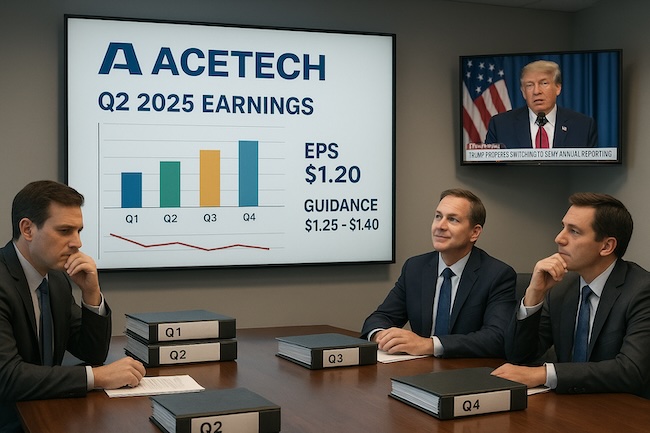Cut Corporate Reporting to Semi-Annually, Says Trump
By Reuters | 15 Sep, 2025
Letting publicly-traded corporations report earnings every six months instead of every quarter is seen as a way to cut costs and encourage more long-term planning.
U.S. companies should be allowed to report earnings every six months instead of on a quarterly basis, President Donald Trump said on Monday, announcing what could prove to be a major shift for corporate America.
The president said on his social media site Truth Social that change, which he had previously called for in 2018, would cut costs and discourage shortsightedness on the part of publicly traded companies. The U.S. Securities and Exchange Commission said it was making Trump's proposal a priority.
"This will save money, and allow managers to focus on properly running their companies," Trump said. Currently, the SEC requires corporations to report their financial statements every 90 days. Half-yearly reporting would mark a huge change in disclosure requirements and put the U.S. in line with the U.K. and several countries in the European Union.
The agency in 2018 solicited public comment on possible changes but ultimately left the current regime in place. This time the SEC appeared fully on board.
“At President Trump's request, Chairman Atkins and the SEC is prioritizing this proposal to further eliminate unnecessary regulatory burdens on companies," a spokesperson said.
Trump's call puts him squarely on one side of a persistent tension between companies, on one hand, that seek to lessen the burdens of frequent market updates, and investor demands for information on the other.
Some investors have cautioned that waiting longer for financial information would mean less transparency and increased market volatility, making U.S. stocks less attractive, although several on Monday said they supported the idea. Transparency advocates also say it could give companies greater opportunity to hide or delay the disclosure of bad news.
Adena Friedman, chair and chief executive at Nasdaq, said in a post on LinkedIn that her company strongly supported allowing companies to choose to report less frequently, as this would minimize the "friction, burden and costs" of listing on Wall St.
Investors argue that one of the reasons U.S. stocks trade at a premium to equities elsewhere is due to greater financial reporting requirements. The U.S. benchmark S&P 500 index is trading at 24.3 times earnings estimates for the next 12 months, compared to 15.28 times for Europe's STOXX 600, according to data compiled by LSEG.
M. Todd Henderson, a law professor at the University of Chicago and an expert on securities regulation, said he expected many companies would continue to feed investor appetite for quarterly disclosures even if the SEC ceased requiring this.
"Overwhelmingly the practice would stay just as it is," he said. "That companies' behaviors are wildly distorted by short-termism is certainly true in some cases but it's not a system-wide phenomenon."
Companies listed in the U.S. did not always report their financial results on a quarterly basis. The U.S. regulator mandated the shift from semiannual to quarterly reporting in 1970.
In 2018, top corporate bosses Jamie Dimon and Warren Buffett argued in a Wall Street Journal op-ed that short-termism was harming the U.S. economy.
The U.S. Chamber of Commerce and Business Roundtable, which represent major corporations and their executives, have in the past called for companies to move away from quarterly earnings guidance, saying it caused companies to take their eyes off long-term goals and was thus a disservice to investors.
The Council of Institutional Investors, which represents retirement savings funds, told the SEC in 2019 that the current system lets investors make timely decisions about companies' progress toward their goals.
Jill Fisch, a professor at the University of Pennsylvania law school and an expert in securities regulation, said making investors wait to learn of economically significant changes in a company's performance could make markets less efficient.
"Our capital markets are the gold standard in the world for their efficiency and transparency," she said. "I don't know that we want to be emulating markets that people view as less attractive."
(Reporting by Brendan O'Brien, Doina Chiacu, Johann M Cherian and Douglas Gillison; Editing by Bernadette Baum, Saumyadeb Chakrabarty, Michelle Price, Mark Porter, Nick Zieminski and Lincoln Feast.)

Asian American Success Stories
- The 130 Most Inspiring Asian Americans of All Time
- 12 Most Brilliant Asian Americans
- Greatest Asian American War Heroes
- Asian American Digital Pioneers
- New Asian American Imagemakers
- Asian American Innovators
- The 20 Most Inspiring Asian Sports Stars
- 5 Most Daring Asian Americans
- Surprising Superstars
- TV’s Hottest Asians
- 100 Greatest Asian American Entrepreneurs
- Asian American Wonder Women
- Greatest Asian American Rags-to-Riches Stories
- Notable Asian American Professionals

